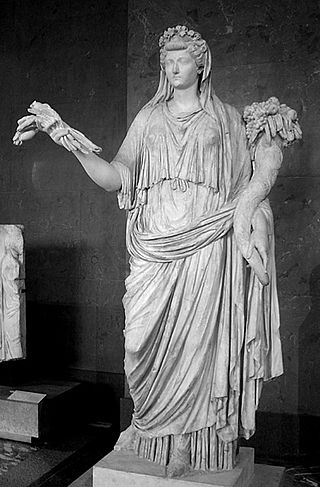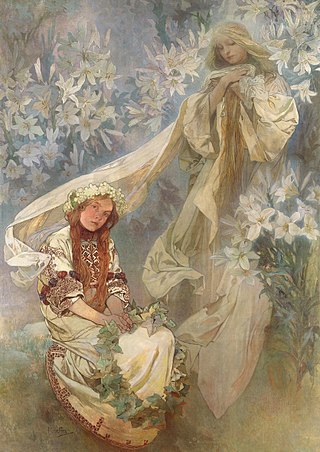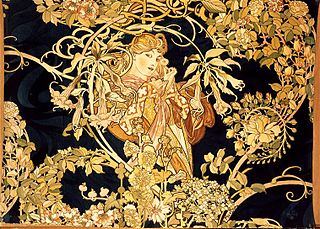Related Research Articles
Gita, or Geeta is an Indian feminine given name.
Ethel is an Old English word meaning "noble", today often used as a feminine given name.
Lina is a feminine given name. Languages of origin include: English, Italian, language |Turkish]]Lithuanian, Russian, Spanish, Swedish, Persian, Kurdish, Arabic. It is also the short form of a variety of names ending in -lina including Catalina, Angelina, Carmelina, Carolina, Emelina, Marcelina, Nikolina, Rosalina, Italina, and Žaklina. Lina is a Finnish, Italian, and Slovene feminine given name that is a feminine form of Lino, Lin, and Linus.
Edith is a feminine given name derived from the Old English word ēad, meaning wealth or prosperity, in combination with the Old English gȳð, meaning strife, and is in common usage in this form in English, German, many Scandinavian languages and Dutch. Its French form is Édith. Contractions and variations of this name include Ditte, Dita, and Edie.
Philippa is a feminine given name meaning "lover of horses" or "horses' friend". Common alternative spellings include Filippa and Phillipa. Less common is Filipa and even Philippe. It is the feminine form of the masculine name Philip. It is composed of the Greek elements philein and hippos (horse), and is derived from the name of Alexander the Great's father, the ancient Greek king, Philip II of Macedon, who was an avid horse lover. The name is commonly shortened to the nicknames Pippa, Pippy, Pippita, Pipka, Pippulina, and Pip. Notable people with the name Philippa include:

Renée is a French/Latin feminine given name and surname.

Patricia is a female given name of Latin origin. Derived from the Latin word patrician, meaning "noble"; it is the feminine form of the masculine given name Patrick. The name Patricia was the second most common female name in the United States according to the 1990 US Census. Another well-known variant of this is "Patrice".

Florence is an androgynous French and English given name. It is derived from the French version of (Saint) Florentia, a Roman martyr under Diocletian. The Latin florens, florentius means "blossoming", verb floreo, meaning "I blossom / I flower / I flourish". Florence was in the past also used as a translation of the Latin version Florentius, and may be used in this context as a male given name.

Hannah also spelled Hanna, Hana or Chana, is a feminine given name of Hebrew origin. It is derived from the root ḥ-n-n, meaning "favour" or "grace"; A Dictionary of First Names attributes the name to a word meaning 'He (God) has favoured me with a child'. Anne, Ana, Ann, and other variants of the name derive from the Hellenized Hebrew: Anna.
Niamh is an Irish feminine given name, anglicised as Neve, Nieve, Neave, Neavh or Neeve.

Bridget is an Irish female name derived from the Gaelic noun brígh, meaning "power, strength, vigor, virtue". An alternate meaning of the name is "exalted one". Its popularity, especially in Ireland, is largely related to the popularity of Saint Brigid of Kildare, who was so popular in Ireland she was known as "Mary of the Gael". This saint took on many of the characteristics of the early Celtic goddess Brigid, who was the goddess of agriculture and healing and possibly also of poetry and fire. One of her epithets was "Brigid of the Holy Fire". In German and Scandinavian countries, the popularity of the name spread due to Saint Bridget of Sweden.

Jennifer, also spelled Jenifer or Jenefer, is a feminine given name, the Cornish form of Guinevere, that became popular in the English-speaking world in the 20th century.

Miranda is a feminine given name of Latin origin, meaning "worthy of admiration". There are several variants. The given name is said to have been invented by William Shakespeare for a character in his play The Tempest.

Lily is a feminine given name usually derived from lily, the flower. The name became particularly popular along with other flower names for girls during the 1800s and early 1900s. The lily also has associations with and has been symbolic of innocence and purity in Christian art. Names beginning with or containing the letter L have also been particularly fashionable for girls. It is also occasionally used as a diminutive for other names such as Elizabeth.
Avery is traditionally a male given name which was originally an Old English surname that was itself derived from an Old French pronunciation of the name Alfred or the Ancient Germanic name Alberich. The name is derived from the Old English words aelf, meaning elf, and ric, meaning power/mighty/king/ruler and dates back to the 16th century.

Daisy is a feminine given name. The flower name comes from the Old English word dægeseage, meaning "day's eye". The name Daisy is therefore ultimately derived from this source. Daisy is also a nickname for Margaret because Marguerite, the French version of the latter name, is also a French name for the oxeye daisy.
Gale is a given name. It has seen masculine and feminine use consecutively in the United States. Gale as a man's name is from an English surname, ultimately from Middle English gaile "jovial". As a woman's name, it is a short form of the biblical name Abigail. It can also be used as a form of the name Galen, a name derived from that of the ancient Greek physician, meaning "tranquil."
Rowan or Rawan is a traditionally masculine Irish given name and surname, now also in use as a given name for girls. Variants of the name include Roan, Rohan, Ruadhán, and Ruadh. The name comes from the Irish surname Ó Ruadháin and from the word ruadh, meaning "red-haired" or "rusty." It is also an Arabic feminine name referring to a river in Paradise. In some instances, the name is given in reference to the tree.
Octavia is a feminine given name of Latin origin meaning eight that derives from the Octavia gens.
Elli is a feminine given name, often a diminutive or a variant of names beginning with El such as Eleanor, Elena, Elizabeth, Ella, Ellen or Ellie. It is also a modern Greek version of the name Helle. Elli is also the personification of old age in Norse mythology. It is also used in use as an Icelandic masculine name of varying origins. Saint Elli was a sixth century Welsh saint who is venerated by the Roman Catholic Church.
References
- 1 2 "Name Search : Zelda". Behindthename.com. Retrieved 2015-07-26.
- ↑ Mike Campbell. "Meaning, Origin and History of the Name Griselda". Behindthename.com. Retrieved 2015-07-26.
- ↑ Douglas Harper (ed.), "Griselda", Online Etymology Dictionary
- ↑ Mike Campbell. "Meaning, Origin and History of the Name Selig". Behindthename.com. Retrieved 2015-07-26.